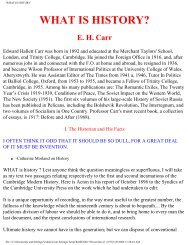The bronze age and the Celtic world - Universal History Library
The bronze age and the Celtic world - Universal History Library
The bronze age and the Celtic world - Universal History Library
Create successful ePaper yourself
Turn your PDF publications into a flip-book with our unique Google optimized e-Paper software.
io6 THE BRONZE AGE AND THE CELTIC WORLD<br />
Now <strong>the</strong> presence of <strong>the</strong>se leaf-shaped swords in pre-Dorian Greece seems to<br />
postulate <strong>the</strong> presence of intruders from <strong>the</strong> Danube basin ; <strong>the</strong> paucity of <strong>the</strong>ir<br />
number, all <strong>the</strong> more striking when we consider <strong>the</strong> extent of <strong>the</strong> excavations carried<br />
out in Greek l<strong>and</strong>s, seems to indicate that <strong>the</strong>se intruders were few. <strong>The</strong>se swords had<br />
been, as we have seen, invented by <strong>the</strong> Nordic steppe-folk in Central Europe, <strong>and</strong> may<br />
sometimes have been used by <strong>the</strong>ir Alpine subjects. But for a few strangers to intrude<br />
into a foreign l<strong>and</strong> needs on <strong>the</strong>ir part considerable cour<strong>age</strong> <strong>and</strong> <strong>the</strong> spirit of adventure,<br />
features which we have found characteristic of <strong>the</strong> Nordic steppe-folk, <strong>and</strong> conspicuously<br />
lacking among <strong>the</strong> Alpines. We may, <strong>the</strong>refore, take it for granted that <strong>the</strong>se intruders,<br />
who introduced <strong>the</strong> leaf-shaped swords into Greek l<strong>and</strong>s, were of Nordic type <strong>and</strong><br />
temperament.<br />
<strong>The</strong> heroes of <strong>the</strong> Trojan War, as Ridgeway has pointed out, were newcomers<br />
to <strong>the</strong> l<strong>and</strong>.^ In most cases <strong>the</strong>ir gr<strong>and</strong>fa<strong>the</strong>rs are mentioned, seldom a great-<br />
gr<strong>and</strong>fa<strong>the</strong>r, unless it is to state that he was a god. Sometimes even <strong>the</strong><br />
gr<strong>and</strong>fa<strong>the</strong>r was a deity, as in <strong>the</strong> case of Polypoites, but usually when this is so we<br />
have reason for believing that <strong>the</strong> hero, like Nestor, <strong>the</strong> gr<strong>and</strong>son of Poseidon, was an<br />
old man. <strong>The</strong> earliest ancestor was sometimes Zeus, but usually <strong>the</strong> pedigree is not<br />
actually traced to <strong>the</strong> divine forefa<strong>the</strong>r. In a large number of cases, especially of <strong>the</strong><br />
minor heroes, <strong>the</strong>y are said to be of <strong>the</strong> stock of Ares. Dr. Hall has suggested that<br />
Ares <strong>and</strong> his mistress Hera were <strong>the</strong> chief deities of <strong>the</strong>se nor<strong>the</strong>rn invaders.^<br />
We hear very little in <strong>the</strong> lUad of <strong>the</strong>se first human ancestors of <strong>the</strong> " Achaeans,"<br />
nor has later Greek legend much more to say about most of <strong>the</strong>m. We have, however,<br />
various stories of heroes, arriving alone hke <strong>The</strong>seus, Perseus, Herakles, <strong>and</strong> Peleus,<br />
or perhaps accompanied by one friend hke Amphitryon, at some Greek city. <strong>The</strong><br />
hero is weU received by <strong>the</strong> king of <strong>the</strong> city, <strong>and</strong> often relieves him of some difficulty,<br />
whe<strong>the</strong>r it be <strong>the</strong> repulse of a hostile attack, as in <strong>the</strong> case of <strong>The</strong>seus <strong>and</strong> <strong>the</strong> Pallantids,<br />
or Amphitryon <strong>and</strong> <strong>the</strong> Telebceans, <strong>the</strong> punishment of robbers, such as Periphates,<br />
Sinis, Sciron, Cercyon or Damastes, or <strong>the</strong> slaying of wild beasts like <strong>the</strong> Cromyon sow<br />
<strong>the</strong> Marathon bull, <strong>the</strong> Cadmeian fox, or <strong>the</strong> various monsters slain by Herakles. <strong>The</strong><br />
king honours <strong>the</strong> visitor, <strong>the</strong> princess, like Ariadne, Comoetho or Polsmiela, falls in love<br />
7 Ridgeway (1901) 339. 8 Hall (1913) 520 fn.







